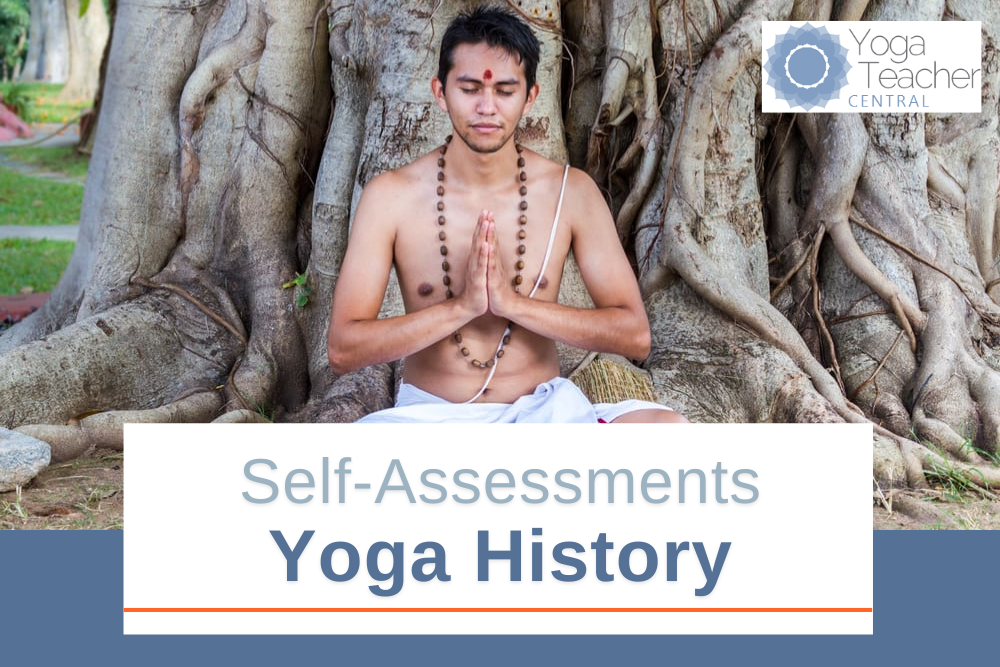
Introduction
Quickly assess your knowledge of Yoga History Foundations, and identify gaps in your education. See below for assessments on these subjects:
- Origins & Sources of Yoga
- Branches of Yoga
Purpose
Offer a series of free quizzes for yoga teachers to:
- Provide an effective way to assess knowledge of each of the Teaching Knowledge Standards.
- Make it easy to self-assess privately, on your own time.
- Help teachers who identify educational gaps to bolster their knowledge with accessible and practical lessons.
More Self-Assessments
For more self-assessments, see the Standards & Self-Assessment Hub.
Origins & Sources of Yoga

Teaching Standard
Gain a basic understanding of the roots of yoga philosophy.
Assessment
- What does research show in regard to the effectiveness of including philosophy in yoga teaching?
- Speak to the fact that yoga philosophy is not taught as a belief system.
- Name and describe the original source of yoga philosophy.
- What texts delving into yoga philosophy followed from the original source?
- Name other key source texts.
- How long ago were the Yoga Sutras written?
- What is the significance of the Bhagavad Gita?
- What is the format of the Gita?
- How is the Hatha Yoga Pradipika different from the Yoga Sutras? What subjects are included in the Hatha Yoga Pradipika?
- Name the person and event often recognized as a key moment in the genesis of yoga’s expansion to the West.
- How do Yoga and Hinduism relate?
- Is Yoga affiliated with religion?
Branches of Yoga

Teaching Standard
Become familiar with the major branches of yoga and their origins.
Assessment
- Name five or more branches of yoga. Provide an English translation for the name of each branch.
- What is the primary focus of Bhakti Yoga?
- Describe Bhakti Yoga practices.
- What are the underlying principles of Karma Yoga? Provide examples of Karma Yoga practices.
- What is the primary tool of Jnana Yoga?
- What is Raja Yoga? What text describes it?
- Describe Raja Yoga practices.
- What is a primary philosophical underpinning of Tantra? What philosophies did Tantra arise in response to?
- How is Hatha Yoga distinguished from other paths? Is it a commonly practiced branch of yoga?
- What is the meaning and purpose of Hatha Yoga?
- How are Hatha Yoga, Tantra, and Raja Yoga related?

In a Nutshell
- The enrollment fee is $25 and is open to Yoga Teacher Central members, past members and non-members.
- Members receive current membership benefits plus additional benefits listed below.
- Enrollment in the Study Program qualifies you for lifetime YTC Teacher status.
Benefits
Enrolling in the Study Program gives you:
- A downloadable Knowledge Standards Lesson Guide to walk you through a structured study path toward certification.
- Selection of 5 downloadable lessons of your choice (from a library of nearly 500).
- Recognition as a YTC Teacher (for life; no expiration).
- Professional marketing kit for highlighting your YTC Teacher status on social media and your website.
- Excellent preparation for taking certification exams.
Members
- Your current membership gives you online access to not only thousands of pages of organized study and teaching knowledge, but also sequence breakdowns and teaching notes, theme plans, injury cheat-sheets, and so on.
- When you enroll in the Study Program, you get these additional benefits: a Knowledge Standards Lesson Guide, selection of 5 downloadable lessons of your choice, and a professional marketing kit for highlighting your YTC Teacher status on social media and your website.

See here for information about exams, badges and certification. Get links for each exam, and for a no-risk trial exam.
We think you’ll enjoy taking the exams. The questions are well-thought-out and the subject matter is quite engaging and significant for teachers. You’ll get an inspiring teaching after answering each question. At the end of the exam, you see a summary of wrong answers and the relevant teachings, giving you a personal study guide targeted to your needs.
This is an hour well-spent!






